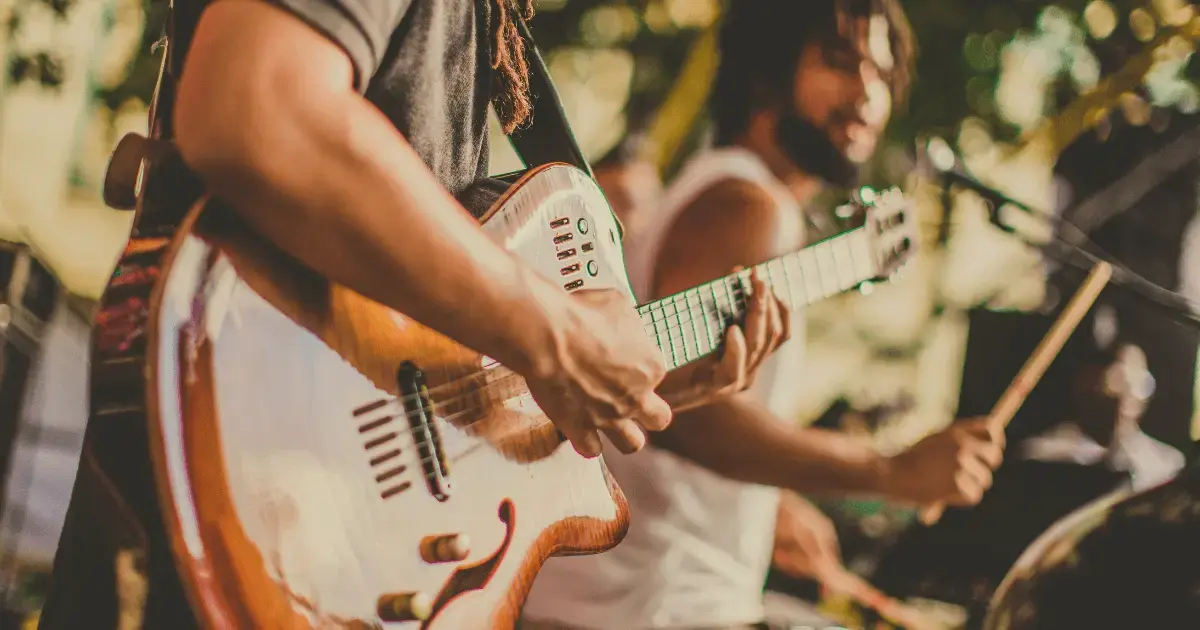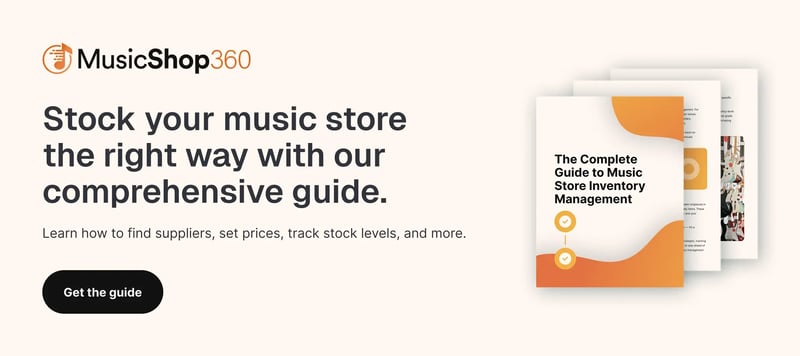
When you host in-store events in your independent music shop, you can run into any number of challenges.
Maybe you book a local band to demo gear, but the turnout is smaller than you hoped because customers never heard about it.
Or you run a workshop to teach beginners the basics, but the crowd that shows up doesn’t get reminders — and half of them forget to come back for the next one.
Or you host a release party that builds buzz, but you have no easy way to track who came or what they bought afterward.
It’s a lot to manage — planning, promoting, keeping things organized, and still trying to run your shop day to day.
But when you get it right, the payoff is worth it.
You hand someone a mic or a guitar and let them feel it come alive in their hands.
You bring local musicians together to swap riffs, share tips, and inspire each other.
You host a workshop or concert that leaves people buzzing with excitement long after they leave.
That’s the magic of in-store events in your music store.
In this blog, we’ll show you how to plan, promote, and manage in-store events that stick — and how to use your point of sale (POS) system to simplify ticketing, track sales, and follow up with attendees.
Let’s dive in.
Why Music Stores Should Host In-Store Events
Events turn passive shoppers into active participants. Instead of browsing a wall of guitars, customers get to hear them in action. Instead of scrolling through online reviews, they get to meet the people who already play them.
Events also:
- Create repeat foot traffic: People who attend once often come back.
- Encourage bigger purchases: Trying gear in person builds confidence to buy.
- Strengthen your brand: You’re no longer “that store by the highway” — you’re the music hub in town.
- Build loyalty: Musicians return to environments where they feel seen and supported.
When customers connect through experiences, they stop comparing you to Amazon. They see you as the place that fuels their passion.
Related Read: 10 Music Shop Customer Loyalty Program Ideas To Keep Customers Coming Back
6 Types of In-Store Events Music Shops Can Host
You don’t need to make every event a big production. The best ones fit your space, budget, and customer base — and, most importantly, they give people a reason to walk in and stay awhile.
Here are some proven crowd-pleasers that music stores of all sizes can use to build community and spark sales.
1. Product Demos & Gear Clinics
Few things sell an instrument or piece of gear faster than hearing it live.
Invite a brand rep, local pro, or one of your staff members to show off what makes a pedal, amp, or keyboard special. Then, hand it over and let customers play.
The key is interaction — encourage people to tweak settings, layer effects, or record a quick loop. Once they’ve felt that wow moment themselves, they’re far more likely to buy than if they just watched a YouTube video at home.
2. Artist Meet-and-Greets & Mini Concerts
Nothing draws a crowd like live music.
Hosting a local artist for an intimate set or a casual Q&A gives your store instant credibility. Fans love being up close, and it doesn’t take a big-name star to make an impact.
3. Workshops & Lessons
Workshops give you a chance to teach, inspire, and plant seeds for future lessons and purchases. Topics can range from “Intro to Drumming” to “How To Record at Home.”
Even if they’re free, you’re creating value that makes people want to come back.
Recurring sessions work especially well. A series like “Thursday Night Guitar Clinics” builds momentum, gives players a reason to return weekly, and turns casual visitors into regulars.
4. Open Mic Nights
Few events build community like an open mic night.
Performers bring friends, family, and energy into your store — and many of them stick around to browse or buy.
You don’t need a huge stage or fancy setup — a corner with a mic and PA works. Sweeten the deal with small prizes, like a set of strings or store credit, and spotlight an act on your social media afterward.
5. Exclusive Release Parties
Whether it’s a limited-edition guitar, a new album, or seasonal gear, people love feeling like they’re first in line. A release party creates excitement, especially if you throw in perks like free swag, early demos, and discounts for attendees.
6. Collaborative Events
Don’t go it alone — partnerships can multiply your reach. Team up with music schools, private teachers, and recording studios. They help promote your store, bring their own crowd, and share the workload.
Co-branded events (like a “Student Showcase presented by [Your Store] + [Local School]”) can fill your space and position you as the best neighborhood music spot.
How To Manage Sign-Ups & Ticketing
The smoother the registration process, the smoother the event. Complicated sign-ups turn people off before they even commit.
Here’s how to keep it easy for both you and your customers:
- Use online registration: Allow customers to sign up online through your website or POS system. Collect names and payments, and send automatic confirmations so they know they’re all set.
- Offer in-store sign-ups: Some customers like to sign up in person. Set up a tablet at the counter or a simple sign-up sheet. It’s quick, easy, and gives walk-ins a chance to join on the spot.
- Track capacity: Keep an eye on registrations and cap attendance when needed. You can use your POS system to track available spots in real time.
- Send automated confirmations and reminders: Confirm registrations via email or text and send a reminder 24–48 hours before the event to reduce no-shows.
- Make check-in painless: On the day of the event, pull up your list and check people in quickly. Smooth check-ins set a professional, welcoming tone from the moment they walk in.
How To Promote Your In-Store Events Effectively
Even the best event won’t fill seats if nobody knows about it. Promotion is all about reaching your audience in ways that feel natural and helpful.
Here are some tips to help promote your event:
- Send email and SMS marketing messages: Your regulars already want to hear from you. Send a few quick messages — one announcing the event, another a few days later with details, and a final reminder the day before.
- Post on social media: Create event pages on Facebook and Instagram. Post teaser videos, artist profiles, and behind-the-scenes content.
- Display in-store signage: Posters, flyers, and chalkboard messages at the register catch the eye of walk-ins. Sometimes people show up simply because they noticed a flyer while shopping.
- Partner with others to promote: Schools, teachers, studios, and music clubs often have their own networks. Collaborate on promotion so both sides get more eyes on your event.
- Offer incentives: Little perks like a free sticker, raffle entry, or a small discount on featured products give people an extra nudge to attend.
How To Use Your POS System To Track Sales & Engagement
Your POS system helps you track and measure success. Use it to uncover insights like these:
- Watch what sells during and after the event: Keep an eye on spikes. Maybe a drumming workshop suddenly makes drumsticks fly off the shelves, or a guitar demo sends pedals and amps out the door. That’s your cue for what people really care about.
- Collect customer info naturally: Every sign-up or purchase gives you a way to follow up. Emails, phone numbers, and notes on what they like can help you invite them to future workshops or demos. Over time, you build a loyal group of local musicians who see your store as their place.
- See which marketing works: Did most people sign up because of your email, a social post, or a flyer in store? Check your POS reports to see where to focus next time instead of guessing.
Your POS system can do a lot more than take payments. It helps you see the story behind your event — what worked, what didn’t, and how to make the next one even better.
Related Read: How To Use Music Store POS Software: 7 Beginner Tips
How To Follow Up After Your Music Store Event
The event itself is just the beginning. How you follow up can turn someone who stopped by once into a loyal customer who comes back again and again.
Here’s what you can do:
- Say thank you: A simple email or text goes a long way. Mention something specific from the event, like the gear they tried or a song they played. It makes your message feel more personal.
- Offer post-event perks: Little discounts or special bundles tied to the event can encourage purchases. For example, a drum clinic attendee might get a week-long discount on sticks or practice pads. Small touches like this make people feel appreciated and keep them coming back.
- Ask for feedback: A quick survey or casual chat can give you insights for next time. Even just asking, “What did you enjoy most?” or “What would you like to see at our next event?” shows you care and helps you plan better.
- Share the experience: Post photos and short clips from the event on social media, highlight a standout performance, or tease your next workshop. People love seeing themselves and their friends featured — and it gets them excited to come back.
Make Every In-Store Event Easier With Music Shop 360
Music Shop 360 was built with music stores in mind — it brings together POS, lessons, rentals, repairs, and e-commerce, so your in-store events become opportunities to build lasting relationships and boost sales.
Here’s how:
- Plan and share without stress: Set up your classes or workshops, view them on a shared calendar, and post the details online.
- Get people in the door: Quick emails and text reminders mean you can announce events, send a nudge a few days before, and follow up afterward — all without juggling a dozen tools.
- Sell without slowing down: Fast checkouts, rentals, and trade-ins let you focus on the event itself. You can even track higher-value gear without worrying about missing details.
- See what really worked: After the event, check attendance, sales, and customer engagement. Figure out which demos landed, which workshops got people excited, and what to tweak for next time.
- Keep it all connected: Sync with your other systems — online sales, lesson scheduling, and accounting.
Want to make running in-store events easier in your music store? Schedule a demo to see how it all comes together.




 by
by 





![4 Music Store Inventory Management Challenges [+ Solutions]](https://musicshop360.com/hs-fs/hubfs/_Blog/Blog%20Featured%20Images/Music%20Shop%20360/1%2029%204%20Music%20Store%20Inventory%20Mangement%20Challenges%20%5BBLOG%5D.webp?width=520&height=294&name=1%2029%204%20Music%20Store%20Inventory%20Mangement%20Challenges%20%5BBLOG%5D.webp)
